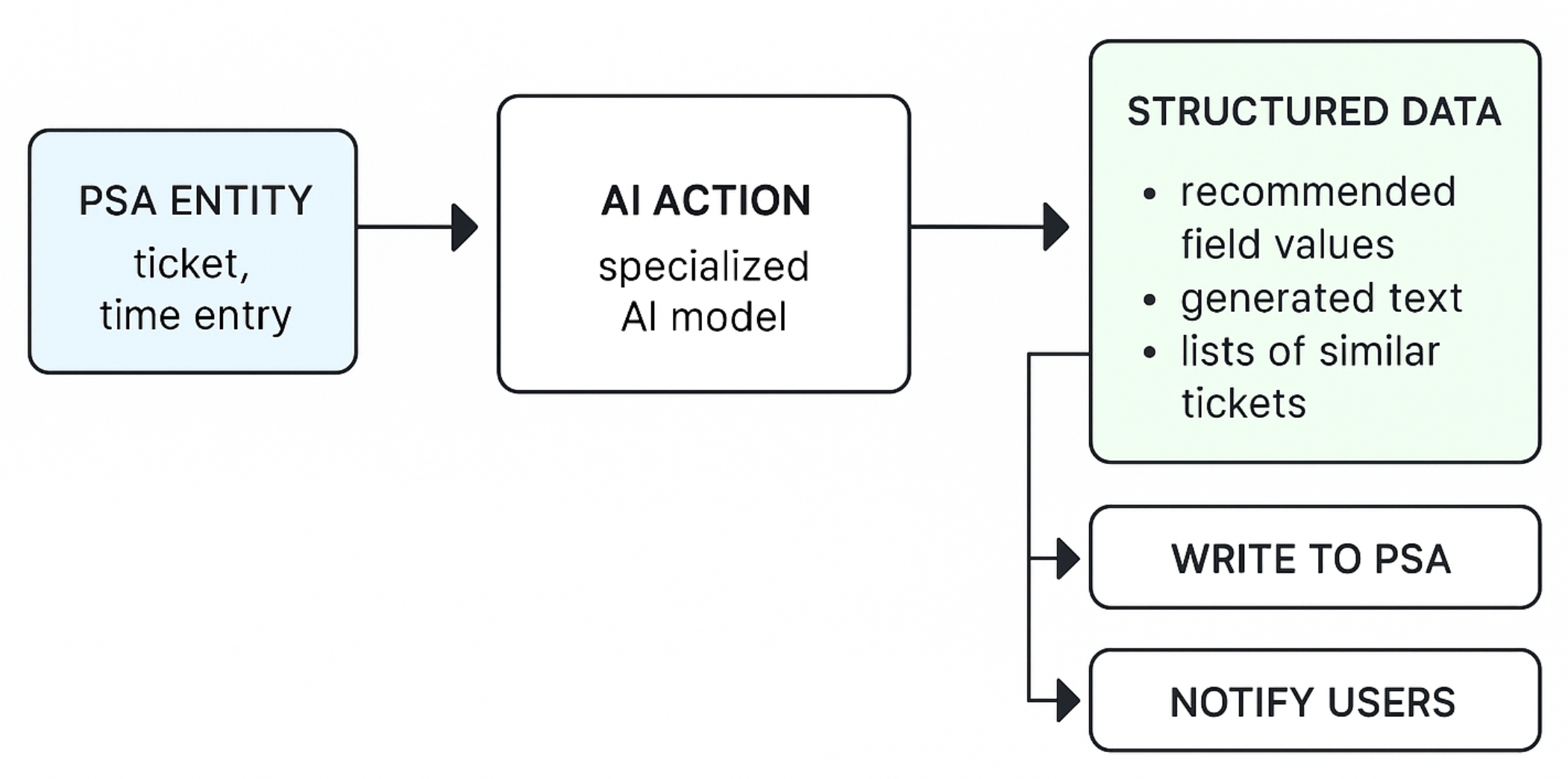Smart Actions
Smart Actions form the core of intelligent automation within Neo Agent. They leverage advanced AI models to perform a wide range of analytical tasks on your PSA data, primarily tickets and time entries. These actions are designed to understand context, extract meaningful information, make decisions, and generate outputs that can drive subsequent steps in your workflows.
Core Capabilities
Smart Actions empower you to:
-
Understand and Categorize: Automatically triage tickets by setting fields like type, sub-type, priority, or even custom fields based on content and historical data (e.g.,
Ticket Triage,Categorize Ticket). -
Analyze and Summarize: Generate concise summaries of complex tickets, identify resolutions, or analyze technician performance against defined criteria (e.g.,
Ticket Summary,Analyze Technician Work). -
Detect Patterns and Sentiments: Identify reoccurring issues, analyze customer sentiment from communications, or check for specific keywords or phrases (e.g.,
Identify Repeated Issues,Analyze Customer Sentiment,Check if it is a Reoccurring Issue). -
Recommend and Suggest: Propose the best technician for a ticket, suggest RMM scripts for resolution, or find relevant knowledge base articles or configurations (e.g.,
Ticket Dispatch (Suggest Technician),Find RMM Script to fix the issue,Find Relevant Configuration,Suggest Resolution). -
Automate Complex Tasks: Handle multi-step processes like L1 support, including clarifying details with users, attempting resolution, and escalating if necessary (e.g.,
L1 Engineer). -
Build Dynamic Content: Generate tailored messages or build the structure for new tickets based on specific conditions and instructions (e.g.,
Build Message,Build New Ticket). -
Custom Analysis: Perform bespoke data analysis using natural language prompts to derive insights from your ticket or time entry data (e.g.,
Data Analysis).
How It Works
Smart Actions typically take PSA entities (like tickets or time entries) as input.
They process this data through specialized AI models, often guided by your custom instructions or predefined settings.
The output is structured data
E.g., recommended field values, generated text, lists of similar tickets that can be used by subsequent actions in the workflow, such as Write to PSA or Notify Users.

Each AI Action is designed to be deterministic and auditable. You can review the inputs, outputs, and reasoning (where applicable) in the Event History to understand and debug workflow executions. Start with simple workflows and gradually add complexity as you become more familiar with the capabilities.
Common Smart Actions
Here are a few examples of commonly used Smart Actions:
Ticket Triage
Automatically sets ticket fields (type, sub-type, priority, etc.) based on content and custom instructions.
L1 Engineer
Acts as a virtual L1 technician to clarify details, suggest solutions, or even attempt to resolve simple issues directly with the end-user.
Ticket Dispatch (Suggest Technician)
Recommends the most suitable technician for a ticket based on skills, availability, and ticket content.
Analyze Customer Sentiment
Detects the sentiment (Positive, Negative, Neutral) from customer communications within a ticket.
Suggest Resolution
Analyzes a ticket and its context to suggest a detailed resolution plan.
Build Message
Generates dynamic messages based on ticket data and your instructions, for use in notifications or notes.
Find Similar Tickets
Identifies other tickets that are similar to the current one, helping to spot duplicates or related issues.
This is just a subset of the available Smart Actions. Explore the actions list when building your workflows to discover the full range of possibilities.